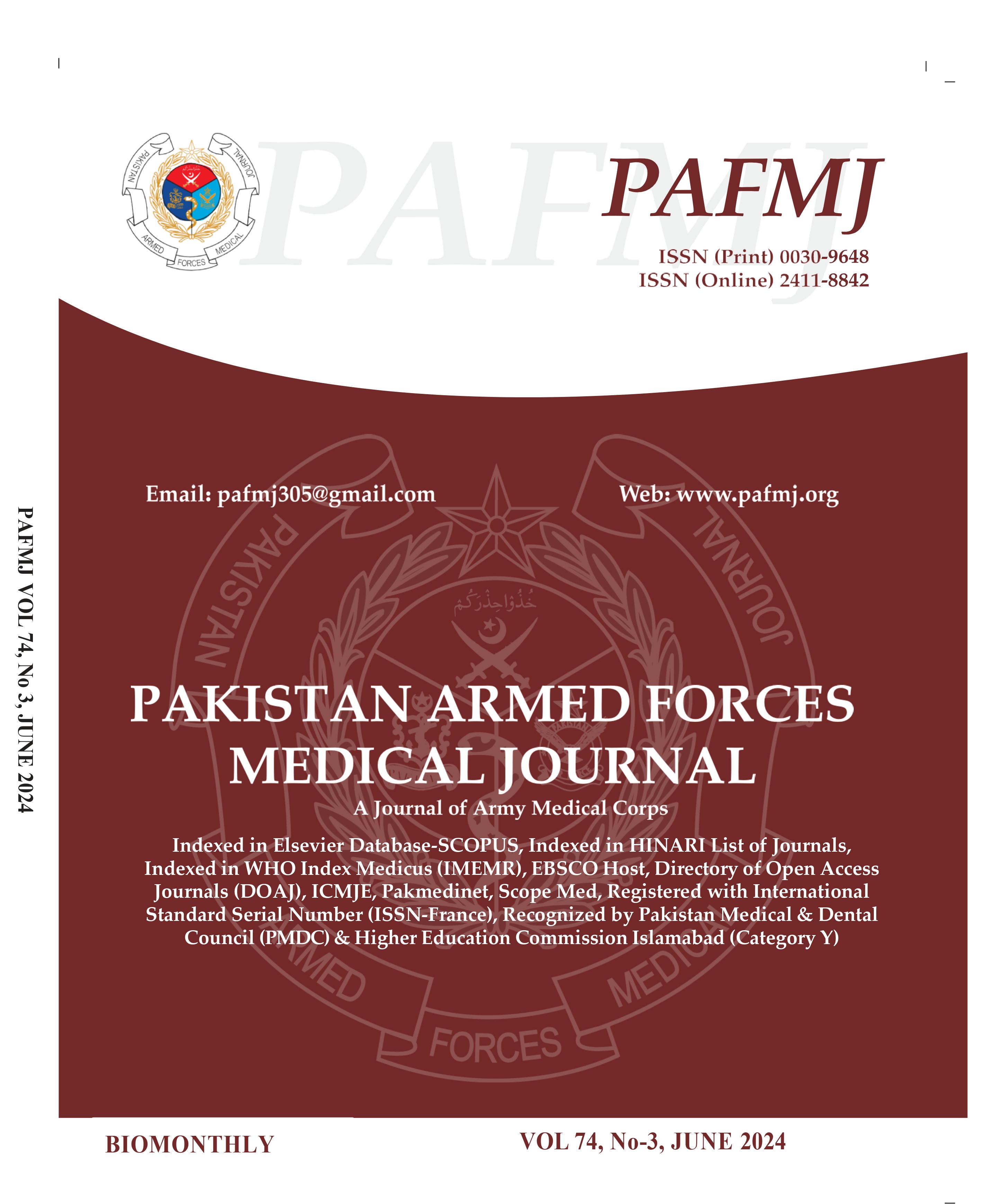Hirsutism and Depression in Polycystic Ovarian Syndrome
DOI:
https://doi.org/10.51253/pafmj.v74i3.8746Abstract
Objective: To determine the frequency of hirsutism and depression in female patients with Polycystic Ovarian Disease and to investigate the association between depression and hirsutism in such patients.
Study Design: Cross-sectional study.
Place and Duration of Study: Gynecology and Medical Department of Fatima Memorial Hospital, Lahore Pakistan, from Jan to Jun 2022.
Methodology: A total of 118 females who fulfilled the inclusion criteria were enrolled after taking written informed consent. Demographic details, clinical history and physical examination findings were noted on a predesigned proforma. Hirsutism was assessed by the Ferriman-Gallwey Method and depression was assessed according to Beck Depression Inventory. Findings were noted down on the proforma and were subjected to statistical analysis.
Results: The mean age of our patients was 32.9±7.09 years, the mean BMI was 26.9±3.13 kg/m2, the mean Beck Depression Inventory value was 10.7±1.38 and the mean Ferriman Gallwey Score was 7.8±1.53. Hirsutism was seen in 19(16.1%) patients and depression in 22(18.6%) females. In patients who had hirsutism, depression was seen in 18(94.7%) patients and the association between hirsutism and depression was found to be statistically significant with a p-value of <0.001.
Conclusion: Hirsutism and depression are frequently present in females with Polycystic Ovarian Syndrome both have significant association with each other.
Downloads
References
Pasch L, He SY, Huddleston H, Cedars MI, Beshay A, Zane LT, et al. Clinician vs self-ratings of hirsutism in patients with Polycystic Ovarian Syndrome: associations with quality of life and depression. JAMA Dermatol 2016; 152(7): 783-788. https://doi.org/10.1001/jamadermatol.2016.0358
Mehrabadi S, Sadatmahalleh SJ, Kazemnejad A, Moini A. Association of acne, hirsutism, androgen, anxiety, and depression on cognitive performance in polycystic ovary syndrome: A cross-sectional study. Int J Reproduct Biomed 2020; 18(12): 1049. https://doi.org/10.18502/ijrm.v18i12.8026
Chaudhari AP, Mazumdar K, Mehta PD. Anxiety, depression, and quality of life in women with Polycystic Ovarian Syndrome. Indian J Psychol Med 2018; 40(3): 239-246. https://doi.org/10.4103/IJPSYM.IJPSYM_561_17
Almis H, Orhon FŞ, Bolu S, Almis BH. Self-concept, depression, and anxiety levels of adolescents with polycystic ovary syndrome. J Pediatr Adolesc Gynecol 2021; 34(3): 311-316. https://doi.org/10.1016/j.jpag.2020.12.011
Sari SA, Celik N, Cicek AU. Body perception, self-esteem, and comorbid psychiatric disorders in adolescents diagnosed with polycystic ovary syndrome. J Pediatr Adolesc Gynecol 2020; 33(6): 691-696. https://doi.org/10.1016/j.jpag.2020.08.018
Greenwood EA, Pasch LA, Cedars MI, Legro RS, Huddleston HG, Network HD, et al. Association among depression, symptom experience, and quality of life in polycystic ovary syndrome. Am J Obstet Gynaecol 2018; 219(3): 279-e1. https://doi.org/10.1016/j.ajog.2018.06.017
Harnod T, Chen W, Wang JH, Lin SZ, Ding DC. Association between depression risk and Polycystic Ovarian Syndrome in young women: a retrospective nationwide population-based cohort study (1998–2013). Hum Reprod 2019; 34(9): 1830-1837. https://doi.org/10.1093/humrep/dez081
Enjezab B, Eftekhar M, Ghadiri-Anari A. Association between severity of depression and clinico-biochemical markers of polycystic ovary syndrome. Electron Physician 2017; 9(11): 5820. https://doi.org/10.19082/5820
Sundararaman PG, Shweta, Sridhar GR. Psychosocial aspects of women with polycystic ovary syndrome from South India. J Assoc Physicians India 2008; 56: 945-948.
Bhattacharya SM, Jha A. Prevalence and risk of depressive disorders in women with polycystic ovary syndrome (PCOS). Fertil Steril 2010; 94(1): 357-359. https://doi.org/10.1016/j.fertnstert.2009.09.025
Asdaq SM, Yasmin F. Risk of psychological burden in polycystic ovary syndrome: A case control study in Riyadh, Saudi Arabia. J Affect Disord 2020; 274: 205-209. https://doi.org/10.1016/j.jad.2020.05.086
Prathap A, Subhalakshmi TP, Varghese PJ. A cross-sectional study on the proportion of anxiety and depression and determinants of quality of life in polycystic ovarian disease. Indian J Psychol Med 2018; 40(3): 257-262. https://doi.org/10.4103/IJPSYM.IJPSYM_221_17
Benson J, Severn C, Hudnut-Beumler J, Simon SL, Abramson N, Shomaker LB, et al. Depression in girls with obesity and polycystic ovary syndrome and/or type 2 diabetes. Can J Diabetes 2020; 44(6): 507-513. https://doi.org/10.1016/j.jcjd.2020.05.015
Lin H, Liu M, Zhong D, Ng EH, Liu J, Li J, et al. The Prevalence and Factors Associated With Anxiety-Like and Depression-Like Behaviors in Women With Polycystic Ovary Syndrome. Front Psychiatry 2021; 12: 709674. https://doi.org/10.3389/fpsyt.2021.709674
Cooney LG, Lee I, Sammel MD, Dokras A. High prevalence of moderate and severe depressive and anxiety symptoms in polycystic ovary syndrome: a systematic review and meta-analysis. Hum Reprod 2017; 32(5): 1075-1091. https://doi.org/10.1093/humrep/dex044
Zhang HY, Guo CX, Zhu FF, Qu PP, Lin WJ, Xiong J. Clinical characteristics, metabolic features, and phenotype of Chinese women with polycystic ovary syndrome: a large-scale case–control study. Arch Gynecol Obstet 2013; 287(3): 525-531. https://doi.org/10.1007/s00404-012-2568-z
Wang Y, Ni Z, Li K. The prevalence of anxiety and depression of different severity in women with polycystic ovary syndrome: a meta-analysis. J Gynecol Endocrinol 2021; 37(12): 1072-1078. https://doi.org/10.1080/09513590.2021.1942452
Ekbäck MP, Lindberg M, Benzein E, Årestedt K. Health-related quality of life, depression and anxiety correlate with the degree of hirsutism. Dermatol 2013; 227(3): 278-284. https://doi.org/10.1159/000355356
Oliveira TF, Oliveira TF, Comim FV. Re: “Prevalence of Hirsutism Among Reproductive-Aged African American Women,” by Chin et al. J Women's Health 2021; 30(12): 1824-1825. https://doi.org/10.1089/jwh.2021.0499
Gnawali A, Patel V, Cuello-Ramírez A, Noor A, Rashid MY, Henin S, et al. Why are Women With Polycystic Ovary Syndrome at Increased Risk of Depression? Exploring the Etiological Maze. Cureus 2021; 13(2): e13489. https://doi.org/10.7759/cureus.13489
Downloads
Published
Issue
Section
License
Copyright (c) 2024 Naveed Shehzad Ahmad, Talha Waheed, Mariam Iftikhar, Arzinda Fatima, Syed Muhammad Omer, Waqas Farooq

This work is licensed under a Creative Commons Attribution-NonCommercial 4.0 International License.















